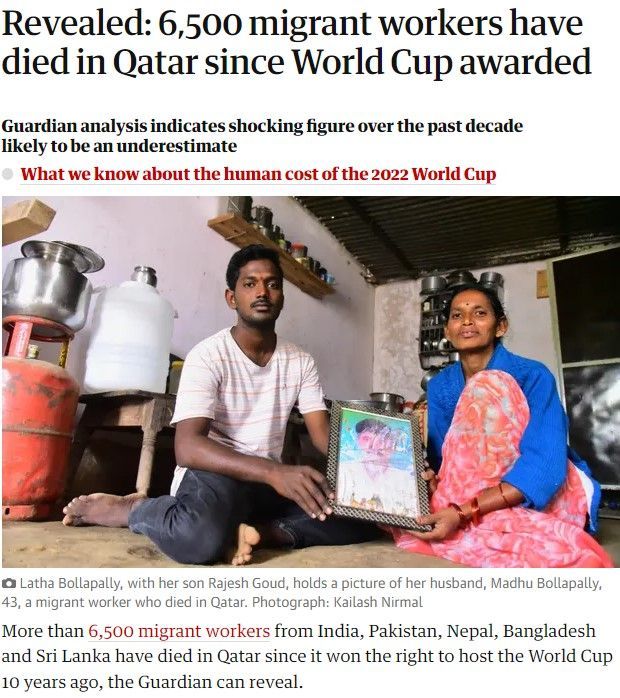
🤔 Shockingly bad? Think for a moment before you swallow the bait
Too bad to be true? The Warp News columnist gives three examples: A white van, dead construction workers in Qatar, and extremely extreme weather.
Share this story!
One of the vignettes used here at Warp News reads "Too bad to be true". It's a brilliant and much needed concept. Getting the media, politicians, organizations and people in general to be as skeptical of the negative as they are of the positive is a constant struggle. Or, equivalently, affirm the positive as much as they absorb the negative.
I will give three very different examples of what I mean.
One
Many years ago, my family and I lived in a Stockholm suburb close to nature. On one occasion, a story about a suspected child abductor was spread in the area. A van had been seen suspiciously close to schools a couple of times. A man who appeared to be taking photographs had been glimpsed behind the open sliding door. It became a life between the parents. Mailing lists were created. Demands were made for guards and temporary closure and that the school's management should "do something", which the principal complied by writing a general email in which it was made clear that although they did not know for sure whether any danger was imminent, but that everyone was still wise to take extra care.

It turned out after a few days that the van belonged to a brokerage firm that sent employees out to photograph objects.
Anyone who had thought for a while right from the start could have come up with several conceivable explanations for the van, and investigating the matter was not that difficult.
Two
In the run-up to the FIFA World Cup, reports about Qatar's degrading treatment of guest workers have been pouring in. Most of it has been much-needed critical journalism that pointed out injustices. A particularly remarkable piece of information has persistently recurred in the reports: that 6,500 foreign workers had died during the construction of the arenas.
Anyone who thought for a moment before the information began to spread widely would have understood quite quickly that it was a little too bad to be true. Qatar is a dictatorship and can be criticized for all sorts of democratic flaws, but it is a very rich country. A very rich country does not build facilities in such an unsafe manner that the employees on the construction sites die like flies. There are no rational (or other) reasons for it, however authoritarian the state is.
After a while, some journalists thought about it and found out where the information came from and how much it had to do with reality. It turned out that the source was an alarmist report that the British The Guardian published in February 2021, and whose most spectacular information was subsequently uncritically reused time and time again. The Guardian enjoys such status. (There is also an even higher death toll, where Amnesty is the source.)

But what does 6,500 dead workers mean? Well, that's the number of migrant workers who died in Qatar from all causes, i.e. cancer, other diseases, heart defects, and everything else you can die of, over ten years. There are over two million migrant workers in the country.
The Guardian never explicitly claimed that all the deaths were on construction sites, but as the figure traveled from headline to headline across the world, this pretty soon became implied information.
How many deaths can really be linked to the construction projects that have been ongoing since Qatar was awarded the World Cup depends on how narrowly one defines the issue, from 3 (arena construction) to "between 400 and 500" (estimate regarding all projects linked to the World Cup investment). In Sweden, 87 people died in construction and 494 people in all workplaces between 2011 and 2020.
The statement about the shockingly large number of dead workers fits in with the preconceived notions many have about dictatorships in general and Gulf states in particular. Sadly, this applies to media producers as well as media consumers.
Those who want to know more about the details of the matter can, for example, read this fact-checking article on Deutsche Welle and this column by Martin Schibbye on Blankspot.
Three
In October 2017, several news media had rambling headlines about the world's extreme weather. The number of weather disasters had increased by a shocking 46 percent in just 13 years, among others SVT, Dagens Nyheter and the Swedish climate minister knew to tell.
The information came from a group of researchers associated with the respected medical journal The Lancet, which even more than in the case of The Guardian above, ensured that no journalist would venture into the source material and take a closer look.
But again: Anyone who only thought for a little while would have soon realized that such a large increase in such a short time would be almost absurd. If the rate of increase is extrapolated backward and forward in time, we would have several times more weather extremes today than a few decades ago, which would have fundamentally changed the living conditions for all of us. But it's not like that. Everyone knows somewhere that droughts, torrential rains, and storms have always regularly occurred.
The truth is that most types of extreme weather events have not increased at all. This is evident both from the IPCC's reports and from the leading database of natural disasters EM-DAT.
The Lancet had started from EM-DAT but amazingly used the trick of choosing points on the curve that seemed to give the reported result.
It's a shame so few think twice when things are too bad to be true. Above all, it is very rare that the counter-images that sometimes try to take hold displace the original, false, story.
Negative narratives are viable. Our reptilian brains constantly scan the environment for dangers, and when there are no real dangers, we construct them. News that implies that something has gone well or that things are working as they should be met with indifference or skepticism. Negative news, on the other hand, lingers even when proven wrong, because "there is no smoke without fire".
I will unsolicitedly think of the oft-repeated Facebook comment "I don't give a shit it's fake, it's damned anyway", which also became the title of a book by the viral reviewer Jack Werner.
Anders Bolling
By becoming a premium supporter, you help in the creation and sharing of fact-based optimistic news all over the world.


